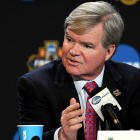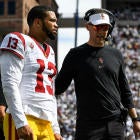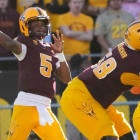GLENDALE, Arizona -- The NCAA traditionally doesn’t legislate morality well.
- It overreached badly on the Penn State penalties.
- A few years ago the NCAA cracked down on offensive team nicknames. William & Mary was shamed by the association for the imagery attached to its nickname “Tribe.” But is there a bigger stereotype than Notre Dame’s iconic team name “Fighting Irish?”
- An organization founded more than a century ago in the name of student safety, has claimed in a court filing it has no “legal duty to protect student-athletes.”
But on a convoluted issue involving gender and bathrooms there will be nothing simple about the NCAA’s next morality stand.
North Carolina on Thursday repealed the controversial HB2 law that required transgender persons to use the bathroom assigned to the gender on their birth certificate.
Even the word “repeal” is up for debate as the ACLU reacted swiftly.
How such a silly law got to that point is another discussion. But the NCAA finds the foundation of its biggest event being pushed, pulled, used, leveraged and challenged.
The NCAA Board of Governors is fast-tracking its consideration of the HB2 repeal. It must. The board is expected to award championships to deserving cities on April 18 for the 2018-2022 cycle.
“Frankly, we’ve been as patient as we possibly can,” Emmert said. “We’ve stretched out the process as far as we possibly could.”
To this point, the NCAA has withheld staging events this year in North Carolina since passage of the original law. Can Carolina afford to essentially sacrifice basketball -- and the commerce it brings -- for such a law?
The answer is complicated. Similar laws are popping up in Texas, site of next year’s Final Four in San Antonio. Kansas is considering one too. Wichita is a first-round site in 2018.
“Moving the Final Four is a very difficult thing to do,” NCAA president Mark Emmert said Thursday.
Difficult, but not impossible. Emmert was asked about a drop-dead date for staging the tournament next year in those states. He wisely said there isn’t one. There is too much at stake.
Indirectly, the NCAA has a chance to change the mind of a nation growing more conservative and divisive by the moment.
At the same time, LGBTQ concerns are popping up in those states, the SEC is wondering whether it will soon be legal to carry concealed weapons into Arkansas football games.
Beginning July 1, it will be legal to carry concealed weapons on college campuses in Kansas with no training and no license. Kansas basketball coach Bill Self and football coach David Beaty won’t be able to ban guns in their programs if they wanted to. It will be illegal.
So you can see there is something insidious at work here. College campuses are supposed to be places of idyllic contemplation, not widespread gun battles between citizens and an active shooter on campus.
Into this sort of wrong-headedness the NCAA must insert its biggest political weapon -- championship events in general and basketball in particular. Emmert wasn’t asked about the gun issue on Thursday, but that’s likely the next hurdle for his association.
Imagine for it being legal for 72,000 folks strolling into a Final Four strapped with concealed weapons. Now imagine the game officials boycotting the games for fear of their safety.
For now, California already has banned travel for state-funded schools to Kansas, North Carolina, Tennessee and Mississippi over state laws it considers discriminatory.
That means the likes of UCLA, for now, can’t play nonconference games in Allen Fieldhouse or the Dean Dome. How sad.
Basketball, then, is the NCAA’s new morality. The NCAA’s ability to withhold the sport from a handful of increasingly narrow-minded states may be its best play.
“The NCAA does not consider itself … an entity that has any business telling a state what their laws should be,” Emmert said.
Technically, he is right. The NCAA with its basketball tournament is a lot like any business looking to stage a convention. There may not enough be enough hotel rooms in a city. The downtown may be run down in another. It may be … Des Moines.
OK, I’m kidding but you get the picture. The NCAA has drawn the line at a law that most right-minded folks consider to be discriminatory.
A chance to change part of a nation’s mind with one of the most significant weapons possible -- a giant sports event -- is noble.
“I’m sure,” Emmert added, “that it is a deep source of frustration for a lot of people that some college events aren’t going on there right now.”
The joke going around is if North Carolina hadn’t made the Final Four, HB2 would have been repealed yesterday. Duke already was subjected to playing in Greenville, South Carolina, when the NCAA moved a first-round site out of Greensboro.
The Blue Devils were upset fair and square by the Gamecocks. But the game turned from a de facto home game for Duke to a de facto home game for South Carolina.
As you can see, then, withholding the tournament not only deprives a state of economic impact, it takes away part of a state’s identity.
“Nobody made the decision to leave North Carolina casually,” Emmert said.
But the NCAA is absolutely considering leaving North Carolina for the foreseeable future.
The NCAA has a chance to impact -- not necessarily change -- the nation’s deep thinking on such issues. How we got to a point where it was a contentious issue where law-abiding citizens went to the bathroom is a symptom of something deeper in this country.
Emmert made it clear to steer the discussion away from morality on Thursday. The board hasn’t spoken. The NCAA has a sketchy track record when trying to guide social conscience.
“This isn’t about North Carolina not being a hospitable place for events. It is,” Emmert said. “But can we conduct them in a way that’s consistent with our values.”
The NCAA has already spoken to exactly what those values are. There are no championship events being played in North Carolina at the moment. Whether that continues is totally up to North Carolina.





















